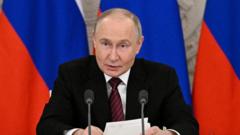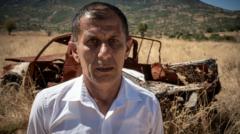After just three days of covering protests in Istanbul, BBC journalist Mark Lowen was detained and subsequently deported by Turkish authorities, highlighting ongoing tensions and media restrictions amid rising calls for democracy.
BBC Journalist Mark Lowen Deported from Turkey Amid Protests

BBC Journalist Mark Lowen Deported from Turkey Amid Protests
Mark Lowen, BBC correspondent, shares his harrowing experience of being deported from Turkey after reporting on anti-government demonstrations.
I had just sent my family a message, thrilled to be back in Turkey, a place that felt like home. Then, my hotel room phone rang. “We have an urgent matter to discuss in person,” the receptionist said. “Could you come down?”
Upon arrival, I was greeted by three plain-clothes policemen who requested my passport and escorted me away, making attempts to block my colleagues from filming the incident. I had been in Istanbul for merely three days, covering the anti-government protests initiated by the arrest of Ekrem Imamoglu, the city's mayor. My first stop was the police headquarters, where I remained for seven hours. Two colleagues could be present, and lawyers were permitted to speak with me. The atmosphere there was surprisingly courteous, with some officers expressing their disagreement with the state’s decision, and one even offered me a hug, wishing for my quick release.
However, at 9:30 p.m., I was transferred to the foreigners’ custody unit in Istanbul. The mood shifted considerably, as I dealt with chain-smoking officers while negotiating in my basic Turkish. I was fingerprinted and denied access to legal representation or any outside contact. When early Thursday morning came, I was given papers indicating my deportation for allegedly being “a threat to public order.” When I inquired about the reasoning, the response was vague, citing a government decision. One officer proposed filming me claiming I was leaving voluntarily, suggesting it might ease my chances of returning in the future, a request I declined, suspecting it would later be twisted by state-controlled media.
By 2:30 a.m., I was moved to the foreigners’ custody area at the airport, where I was placed in a sparsely furnished room filled with hard chairs. Sleep proved elusive amidst the interruptions from officers brushing their teeth, planes taking off, and the morning call to prayer. Seventeen hours after my initial detention, I found myself in a vehicle bound for a plane taking me one-way to London. Later that night, following extensive media attention surrounding my case, the Turkish government released a statement claiming I had lacked the proper accreditation, a justification they had never mentioned during my detention.
Throughout my ordeal, I was never mistreated, fully aware that both BBC management and the British Consulate were tirelessly advocating for my release. This safety net is not available to many others who face similar circumstances with Turkish authorities. During my time as the BBC correspondent in Istanbul from 2014 to 2019, Turkey held the unfortunate title of the world’s largest jailer of journalists, ranking 158th out of 180 countries on the Press Freedom Index by Reporters Without Borders. Around 11 journalists are among the thousands detained amid the ongoing protests.
The unrest erupted following the arrest of Ekrem Imamoglu, a significant political rival to President Recep Tayyip Erdogan, who is seen as increasingly authoritarian. The demonstrations have evolved into fervent calls for democracy in a nation grappling with restrictions on dissent. President Erdogan has dismissed the protests as “street terrorism,” feeling bolstered by the current geopolitical dynamics and Turkey's strategic alliances. As the largest demonstrations in over a decade unfold, the question remains: can the momentum sustain for those calling for change amidst Erdogan's long-standing rule?


















